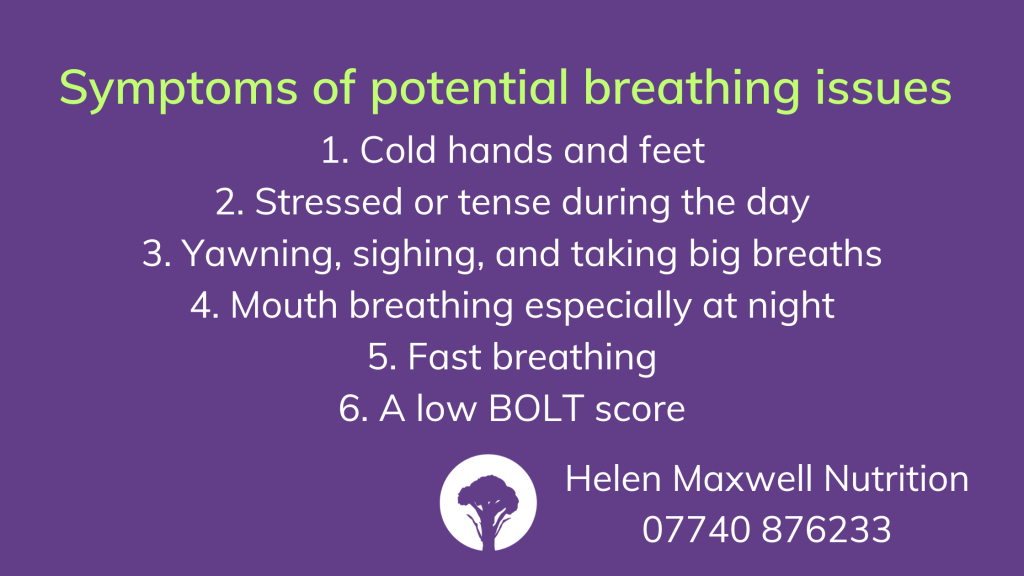
This blog explains how to identify if your breathing might be disordered and why you might consider doing breathwork to improve your health.
There are some very common signs and symptoms that your breathing could be improved which include:

If you notice any of these being relevant to you, it's best to get in touch with me, or your physio or health practitioner for assistance. I discuss each aspect below in more detail.
This is usually attributed to poor circulation. The organs of circulation are the heart and your blood vessels. To allow more blood to circulate the blood vessels need to dilate. CO2 in the smooth muscle cells lining the blood vessels acts as a vasodilator. When we increase our tolerance to the build-up of CO2 this enhances vascular function so how you breathe ultimately influences your body temperature.
This can be triggered by all kinds of issues and seems to be the theme of modern life. When we are stressed the body responds by tensing up. Tension on the outside means tension on the inside so everything contracts including muscles, tissues, blood vessels and our airways. This constriction impedes the way our body functions and over time this tension affects how we breathe on a day-to-day basis. This is because we build neural pathways for breathing so poor breathing can become the default pattern.
We may not always be able to control sources of stress in our life. We can however work with our breath to interrupt our emotional and mental reaction to the stress. These reactions will otherwise continue to stimulate our stress response and restrict how our body functions.
When you work with the breath to relax the body you stimulate your vagus nerve. This one nerve controls whether you are in fight or flight or rest and digest. When you are in fight or flight this is “emergency mode” and not a time for your autonomic nervous system (ANS)to stimulate growth and repair. You don’t start long term building projects when your life is being threatened. By switching the body to rest and digest your automatic functions such as blood pressure, heart rate, respiratory rate and digestion can begin to function properly. When you work on your breath you rewire these neural pathways to something more optimal for the body.

These can all be signs that your body is trying to adjust its’ chemical balance. Unfortunately they can become habits with associated neural pathways which can be difficult to break. Over time this can alter the gas exchange taking place and affect our breathing chemistry namely oxygen, nitric oxide and CO2. This in turn changes your body’s pH balance, forcing the body to make adjustments to facilitate homeostasis.
This is detrimental for several reasons:
This is indicative of disordered breathing see here and here for how to take your BOLT score. A minimum of 25 is preferable.
How fast we breathe affects how quickly we off load CO2. We need to have some tolerance to CO2 build-up because oxygen is released from haemoglobin in the blood, in the presence of CO2. If you breathe too fast the oxygen often doesn’t reach the lower lungs where most of the alveoli are. This reduces the opportunity for oxygen to enter our blood stream and to reach our cells and tissues.
The health issues associated with poor breathing are numerous and include the following: asthma; exercise performance; hormonal issues; covid; blood pressure; pain and fibromyalgia; diabetes; insomnia; snoring and sleep apnoea; anxiety and panic disorders.

It’s one technique with many powerful benefits:
| Open airways | Increases vagal tone |
| Opens blood vessels | Improves your ANS function |
| Increases oxygen to tissues | Increases your heart rate variability |
| Helps support blood pressure levels | Expands lung function |
If you are worried about your breathing or just interested in finding out more you can take the breathing quiz on my website or simply give me a call on 07740 876233 or drop me an email to find out more.





